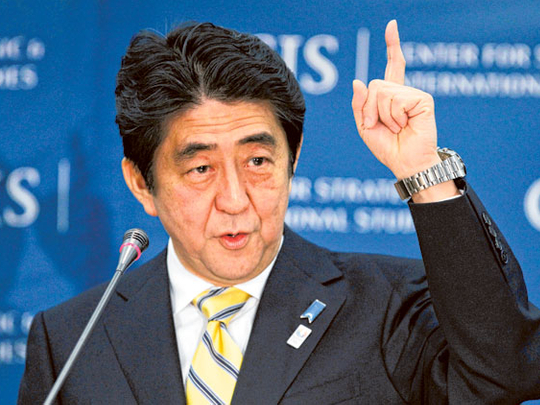
Washington: Japanese Prime Minister Shinzo Abe told Americans on Friday “I am back and so is Japan” and vowed to get the world’s third biggest economy growing again.
Abe, whose troubled first term ended after just one year when he abruptly quit in 2007, has vowed to revive Japan’s economy with a mix of hyper-easy monetary policy, big spending, and structural reform. The hawkish leader is also boosting Japan’s defence spending for the first time in 11 years.
“Japan is not, and will never be, a tier-two country,” Abe said in his speech. “So today…I make a pledge. I will bring back a strong Japan, strong enough to do even more good for the betterment of the world.”
The Japanese leader stressed that his “Abenomics” recipe would be good for the United States, China and other trading partners.
“Soon, Japan will export more, but it will import more as well,” Abe said in the speech. “The US will be the first to benefit, followed by China, India, Indonesia and so on.”
Abe said Obama welcomed his economic policy, while Deputy Chief Cabinet Secretary Katsunobu Kato said the two leaders did not discuss currencies, in a sign that the US does not oppose “Abenomics” despite concern that Japan is weakening its currency to export its way out of recession.
The United States and Japan agreed language during Abe’s visit that could set the stage for Tokyo to join negotiations soon on a US-led regional free trade agreement known as the Trans-Pacific Partnership (TPP.)
In a carefully worded statement following the meeting between Obama and Abe, the two countries reaffirmed that “all goods would be subject to negotiations if Japan joins the talks with the United States and ten other countries.
At the same time, the statement envisions a possible outcome where the United States could maintain tariffs on Japanese automobiles and Japan could still protect its rice sector.
“Recognising that both countries have bilateral trade sensitivities, such as certain agricultural products for Japan and certain manufactured products for the United States, the two governments confirm that, as the final outcome will be determined during the negotiations, it is not required to make a prior commitment to unilaterally eliminate all tariffs upon joining the TPP negotiations,” the statement said.
Abe repeated that Japan would not provide any aid for North Korea unless it abandoned its nuclear and missile programmes and released Japanese citizens abducted decades ago to help train spies.
Pyongyang admitted in 2002 that its agents had kidnapped 13 Japanese in the 1970s and 1980s. Five have been sent home, but Japan wants better information about eight who Pyongyang says are dead and others Tokyo believes were also kidnapped.
Abe also said he hoped to have a meeting with new Chinese leader Xi Jinping, who takes over as president next month, and would dispatch Finance Minister Taro Aso to attend the inauguration of incoming South Korean President Park Geun-hye next week.










